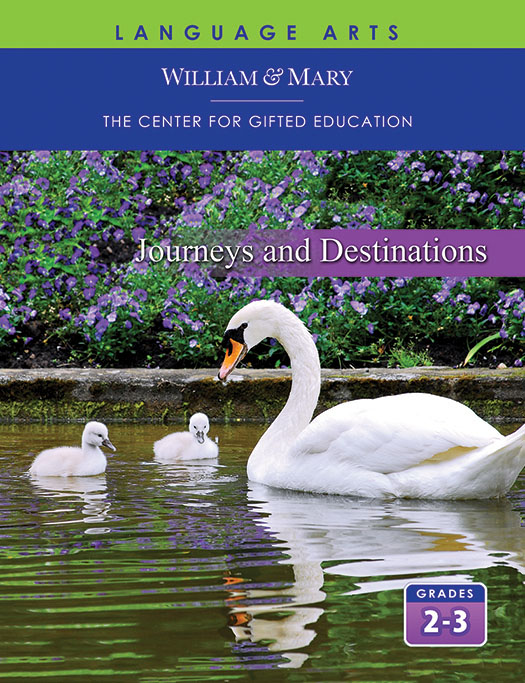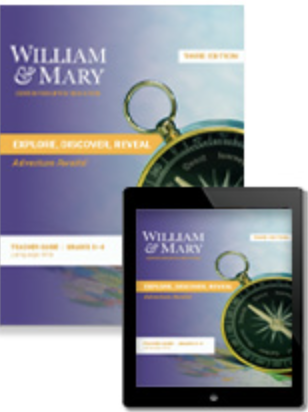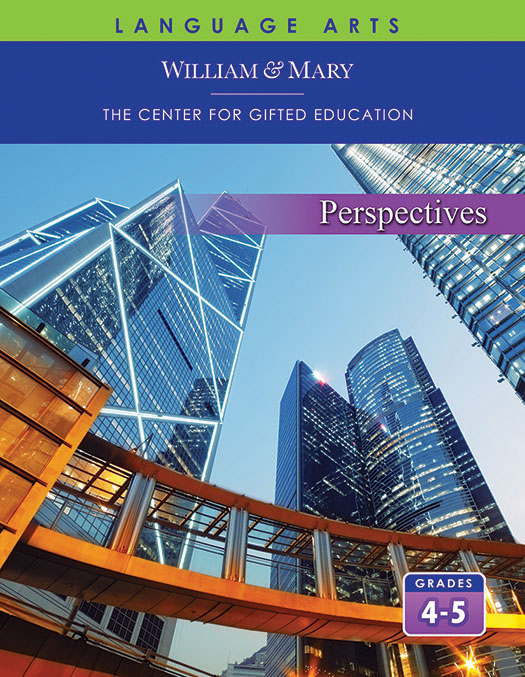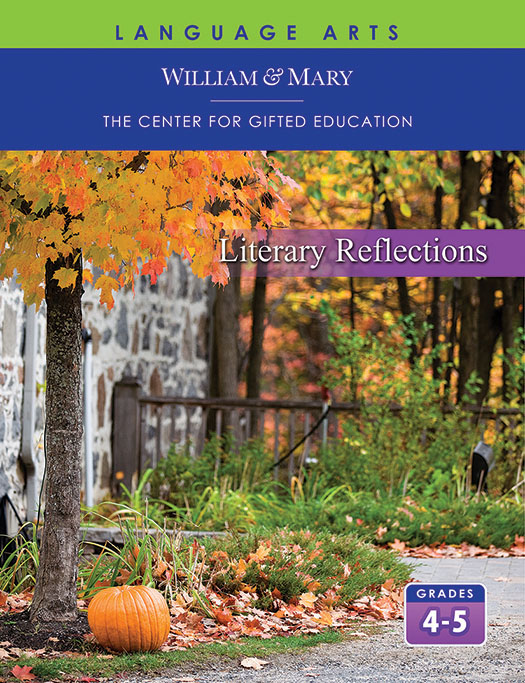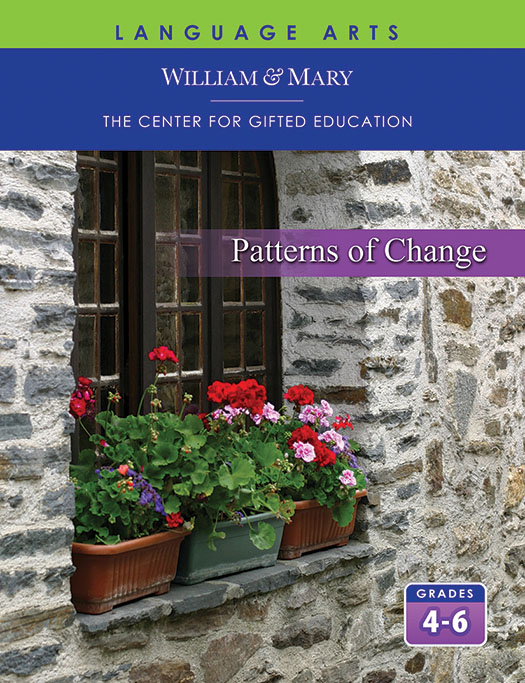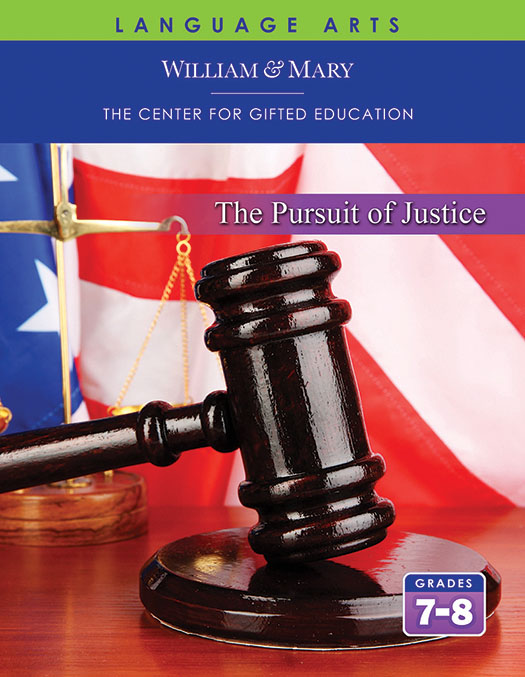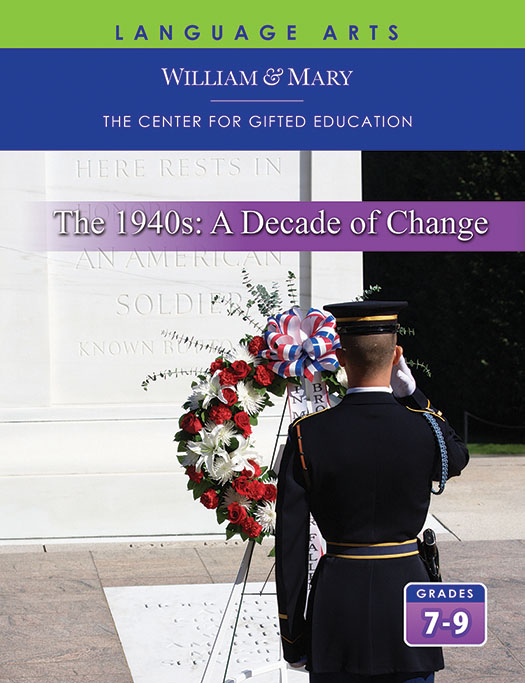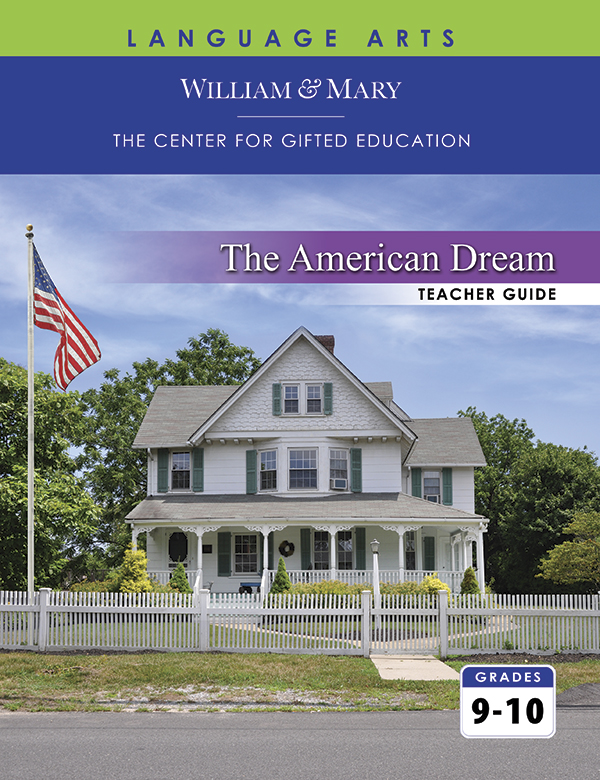Literature Units
Published Units
Language arts literature units are available to purchase from Kendall Hunt. We encourage you to purchase the materials directly from our publisher, and you can do so by clicking on each book’s title.
The William & Mary Language Arts, 3rd Edition has added new features to enrich the units including technology integration, more differentiated products, additional alternate novels and activities, and a culturally-responsive teaching guide. The updated literature means the curriculum is more relevant to today’s students, focusing on diversity and representation of authors, characters, settings, and topics. The result is a program that maintains the reputation of William & Mary’s research-based curriculum and the integrity of their core teaching philosophy. All 17 Language Arts units are being revised and units will be released by the publisher upon completion.
Beyond Words: Figurative Language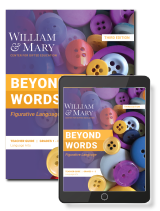
Beyond Words: Figurative Language is designed for grades 1–2, organized around the study of figurative language, explores the idea that language can change the way we think about the world by creating new images and connections in our minds. The unit uses poetry and picture books as the basis for analyzing different types of figurative language, including simile, metaphor, and personification, and gives opportunities for students to create their own literary images. In addition, the unit introduces students to persuasive writing and to advanced word study, as well as providing an opportunity for students to explore how language changes over time in their families and their culture. 2001 Winner of a National Association for Gifted Children Curriculum Division Award for Outstanding Curriculum
Worldly Words: Systems of Language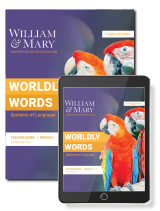
3rd Edition Available
Worldly Words: Systems of Language (formerly World of Wild, Wacky, Wonderful Words) is designed to engage primary students in grades 1-2 with high abilities in the verbal domain with challenging reading, writing, and interpretation skills in the language arts. It reflects the need among young learners for greater exposure to higher-level thinking activities sooner in their school years. In addition, the unit specifically focuses on literature that utilizes extensive figurative language, with the intent of supporting young children’s development of metaphoric competence in the areas of both comprehension and production.
This unit for grades 2–3 uses an inquiry-based approach to investigate literature in an interdisciplinary, multicultural curriculum. The guiding theme of this unit is the recognition of change as a concept that affects people and their relationships to the world around them. An open-ended approach to the discussion process is emphasized in the search for meaning in literature selections such as Aesop’s fables, The Green Book, Bringing the Rain to Kapiti Plain, and “The Ugly Duckling.” Vocabulary development, writing activities, oral communication, research, and reasoning are integrated into the unit. 1998 Winner of a National Association for Gifted Children Curriculum Division Award for Outstanding Curriculum
3rd Edition Available
This unit is organized around the idea that our world has many exciting places and ideas to explore and that exploration can be done both physically and cognitively. Students in grades 3-4 will learn to adopt the mindset of an explorer and grow to understand that each of us explores the world in many different ways.
3rd Edition Available
In Mind Your Time, the reading selections and the activities were designed to intrigue and challenge students in grades 4-5 to think about time and its role in their lives. This unit is centered on the concept of time and will involve a wide variety of literature to provide context for discussions, writing, listening, vocabulary studies and research activities.
The guiding theme of this unit is the recognition that people have their own perspectives based on their experiences in the world around them. The literature selections of the unit will allow students in grades 4-5 the opportunity to view and study multiple perspectives. Students will reflect on their own perspectives as well as the perspectives of characters in and authors of classical literature.
Although all four language arts strands of literature, writing, language study, and oral communication are integrated into this unit for grades 4–5, the core involves students interacting with literature while enhancing reading comprehension and textual analysis skills. The literature selections, including The Secret Garden and world-class short stories by such authors as Tolstoy and Singer, serve as a basis for discussion. 2000 Winner of a National Association for Gifted Children Curriculum Division Award for Outstanding Curriculum
The concept of cyclic patterns of change was chosen as the unifying theme for this unit. Selected literary works deal with cycles in nature, knowledge, history, and human life. Students in grades 4–6 are introduced to some of the important approaches and ideas of literary criticism. Students are encouraged to use journals, literature webs, essays, and visual projects to organize and express their ideas about various literary selections. Works studied in the unit include My Daniel by Conrad, “The Helpful Badger” by Lawrence Yep, and poetry by Dickinson, Sandburg, Angelou, and Shakespeare.
3rd Edition Available
In this unit, students in grades 5–6 study the concept of change by reading autobiographies of writers and by looking at change in the lives of writers and other artists. As they examine life stories and self-portraits, they study literature and examine works of art from various cultures. In order to gain insight into the development of talent, students are encouraged to explore their own identities as talented learners through discussions, research, oral presentations, and reflective writing. Autobiographical writings from authors including Beverly Cleary, Eloise Greenfield, Isaac Singer, and Lawrence Yep are explored. 1997 Winner of a National Association for Gifted Children Curriculum Division Award for Outstanding Curriculum
This unit for grades 6–7 highlights elements of persuasion, especially as it relates to oral communication. Students must cite passages from literature to defend their points of view in discussion as well as in written arguments. Literature selections such as “The Valiant,” “The Pied Piper of Hamelin,” and the Declaration of Independence frame the basis for exploring the reasoning process through analysis and interpretation. Opportunities are presented for impromptu, informative, and persuasive speeches; debate; small- and large-group discussion; and critical reasoning. Persuasive writing, reasoning, research, and language study are included throughout the unit.
Courage: Connections and Reflections
3rd Edition Available
Courage: Connections and Reflections offers students in grades 7-8 the chance to compare and contrast their own lives with those of others. The unit explores social and historical issues by studying people, historical time periods and events, and students’ own lives. Novels, short stories, poetry, art, and music will be the avenues for addressing unit goals. Students will be given numerous opportunities for reading, writing, listening, and speaking.
This unit is about the path man has taken in his desire for justice. Students in grades 7-8 will explore the South of the 1930s in the perennial classic To Kill a Mockingbird by Harper Lee; they will also read some of her short stories and essays that have intrigued readers. The plight of the Little Rock Nine becomes a first person account in Warriors Don't Cry by Melba Pattillo Beals. Students will read the primary source newspapers of the day to get other perspectives on how the fight for civil rights and integration shook the nation. They will also travel the path of the migrant ranch hand in John Steinbeck's Of Mice and Men. Students will also have a chance to examine poetry, songs, essays, and art that portray "the pursuit of justice." Vocabulary and grammar will align with the readings. Opportunities to research, write expository pieces, and creative meaning for themselves are abundant in this unit.
This unit for students in grades 7–9 looks at the historical events and social issues of the 1940s through the literature of the decade, including novels, short stories, poetry, essays, letters, and newspapers. Numerous opportunities for reading, writing, listening, linguistic competency, and speaking are incorporated into the unit. Each student is required to pose a hypothesis and conduct research concerning some issue of significance that arises from the literature that is studied. Students make both a written and an oral presentation of their research. The unit is rich in materials that highlight the concept of change, including works such as Hersey’s Hiroshima, The Diary of Anne Frank, and Spiegelman’s Maus II.
3rd Edition Available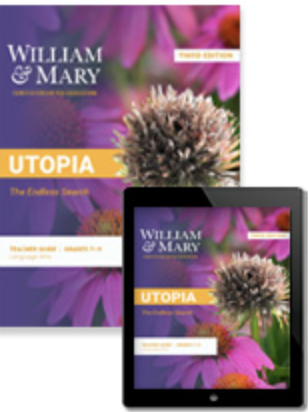
This unit for grades 7–9 provides an overview of utopia as seen by various individuals, groups, and countries and gives students an opportunity to examine why ideas about utopia undergo change. Through the study of literature, art, music, and other classroom activities, students learn about the search through the ages for utopia and the struggles to grasp and maintain it on both personal and societal levels. Exploring utopia through personal dreams and goals allows students to analyze the literature they read more thoroughly throughout this unit. Literature selections include Orwell’s Animal Farm, Lowry’s The Giver, Twain’s “The Man That Corrupted Hadleyburg,” and poetry by Cavalli and Enzensberger.
Threads of Change in 19th Century American Literature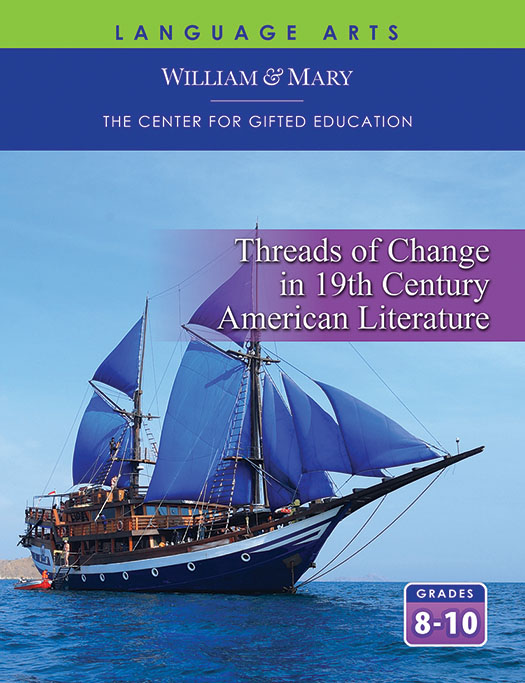
This unit, designed for students in grades 8-10, uses literature of the 19th century to explore five historical movements: romanticism, transcendentalism, abolitionism, industrialism, and feminism. Each of the five “isms” has its own literature box containing appropriate documents to serve as a resource for teams of students. The “isms” are investigated as change agents in American life through the study of key writings of the period. Literary works studied in the unit include Twain’s The Adventures of Huckleberry Finn, Melville’s Billy Budd, Sailor, Hawthorne’s “Dr. Heidegger’s Experiment,” and selected Poe short stories.
The American Dream explores how humans’ quest for peace, prosperity, and progress leads them towards a sometimes elusive goal. Through classroom activities and the study of rich, challenging literature, students in grades 9-10 will learn that pursuit of the “American Dream” can cause joy and despair as well as other emotional and physical reactions in humans. Using current and historic documents, literature, art, photography, and music, students will be provided with avenues to compare and contrast their own ideas about the American Dream with those of peers, communities, and society.
Change Through Choices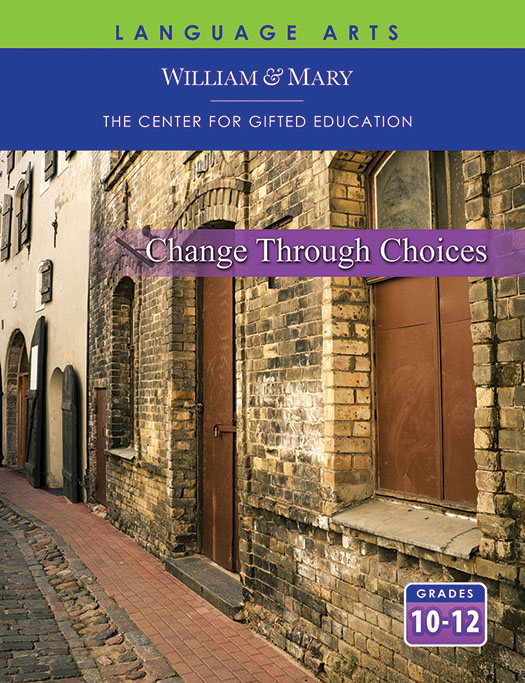
Choices and the consequences of choices that people make have an important impact on life and the success of individuals. This unit, designed for students in grades 10–12, focuses on catalytic choices that determine change in a variety of situations. Rich in content, the world literature chosen can be analyzed and synthesized for depth in understanding cultural similarities and differences. This unit attempts to give the student a chance to question real-world choices and problems and decide what valuable lessons can be learned through careful individual examination of options.

